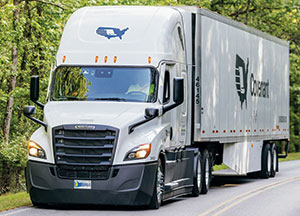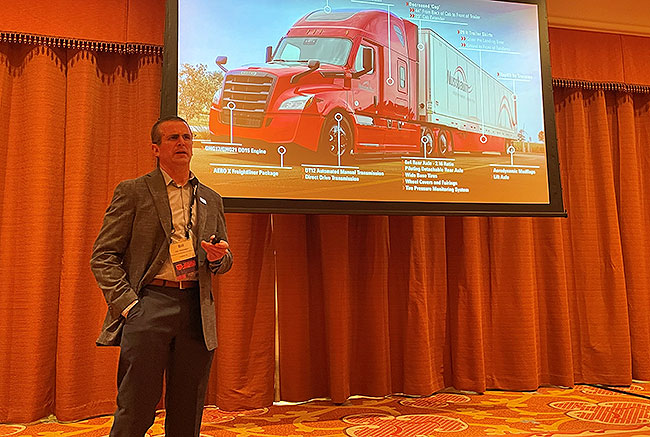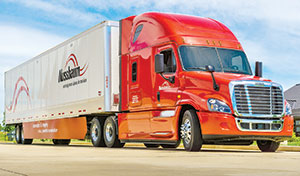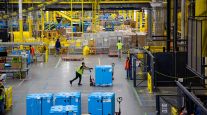Managing Editor, Features and Multimedia
Shippers Turn to Trucking for Help Meeting Carbon Reduction Goals

[Stay on top of transportation news: Get TTNews in your inbox.]
LAS VEGAS — As large corporations make bold pledges to achieve carbon neutrality in the coming decades, they are increasingly looking at their supply chains as an opportunity to make progress toward those goals.
In addition to asking motor carriers the usual questions about reliable service, safety and pricing, many large shippers are raising the issue of environmental sustainability and carbon emission reductions, said Matt McLelland, vice president of sustainability at Covenant Logistics.
Trucking companies must be aware of this shift and should begin preparing for it, he said.

Covenant has begun receiving requests for proposal from shippers seeking information about its efforts to reduce emissions and maximize the efficiency of its fleet. (Covenant Logistics Group)
“Your customers are going to start asking you about it, and probably already have,” McLelland said during a session at the Truckload Carriers Association’s annual conference, held March 19-22.
Freight transportation emissions will become an increasingly important focal point for large corporations that are targeting carbon neutrality by 2050 or even 2040.
“Every molecule of carbon that your truck puts out belongs to their carbon footprint,” McLelland said.
In recent years, Covenant has begun receiving requests for proposal from shippers seeking information about its efforts to reduce emissions and maximize the efficiency of its fleet, as well as its thoughts on electrification and hydrogen fuel cell technology.
Fleet executives will need to address those types of questions regardless of their personal stances on issues such as climate change.
“It doesn’t matter where you are on the spectrum if you’re a fleet in this room,” McLelland said. “It’s really important to these customers, and so it needs to be really important to you.”
See the 2022 Top 100 rankings
►Top 100 For-Hire Interactive Map
►How the Pandemic Accelerated Change for Motor Carriers
►2022 List Illustrates Growth of Large Fleets
Sector Rankings
LTL | TL/Dedicated
Intermodal/Drayage
Motor Vehicle/Driveaway
Tank/Bulk | Air/Expedited
Refrigerated | Flatbed/HS
Package/Courier | Mail
Household Goods/Commercial
A growing number of shippers are codifying their environmental sustainability goals through position papers on corporate social responsibility, or CSR, as well as environmental, social and governance criteria, or ESG — statements with clear metrics and objectives that these companies intend to meet in the years ahead.
McLelland said he reviewed the environmental sustainability positions of Covenant’s 10 largest customers by revenue.
He found that all 10 had either a CSR or ESG plan, ranging from about 45 to 100 pages, and eight out of those 10 customers had “very significant positions on Scope 3 emission reduction, which is the role that we play in their carbon footprint.”
“Scope 3” emissions are those generated by activities and assets not directly owned or controlled by the corporation, which includes freight transportation and distribution conducted by their trucking and logistics providers.
This topic could take on an added dimension for publicly traded motor carriers.
A potential regulatory change recently proposed by the U.S. Securities and Exchange Commission would require publicly traded companies to disclose their greenhouse gas emissions and other climate-related information in their registration statements and annual reports.
As trucking companies consider technologies and equipment to improve efficiency and reduce emissions, some of those investments pay for themselves through fuel savings.
But other technologies that might not make financial sense could still provide a “social” return on investment by helping customers meet their sustainability targets, McLelland said.
Covenant Logistics Group, based in Chattanooga, Tenn., ranks No. 46 on the Transport Topics Top 100 list of the largest for-hire carriers in North America, and No. 77 on the TT Top 100 logistics list.
Advances in electric vehicle technology are making zero-emission trucking possible in certain applications. Battery-electric trucks are beginning to enter the market and can be a good fit for certain shorthaul and regional operations. Truck manufacturers also are pursuing hydrogen fuel cell technology.
In the meantime, however, there is still much fleets can do to make their existing diesel trucks more efficient.

Bill Wettstein by Seth Clevenger/Transport Topics
Bill Wettstein, chief financial officer at Nussbaum Transportation, shared how his company has improved efficiency through technologies that are widely available today.
The Hudson, Ill.-based dedicated and truckload carrier has outfitted its trucks with a range of products and systems designed to conserve fuel and reduce costs.
The company’s fleet of about 400 trucks has surpassed 9 miles per gallon in recent years, hitting 9.3 or 9.4 mpg during the best months, Wettstein said.
“We didn’t do it because of environmental reasons. We did it because of financial reasons,” he said.
Nussbaum has equipped its tractors with battery-powered auxiliary power units as well as solar panels to help charge the batteries.

Nussbaum's fleet of about 400 trucks has surpassed 9 mpg in recent years. (Nussbaum Transportation)
To reduce aerodynamic drag, the company has decreased the gap between the tractor and trailer with cab extenders and has added 29-foot trailer side skirts, trailer TopKits by Transtex, aerodynamic mudflaps, wheel covers and tandem axle fairings.
The fleet also uses wide-base tires and a tire pressure monitoring system to further enhance efficiency.
Wettstein noted that Nussbaum keeps its trailers for 10 years and its trucks for about 650,000 miles, giving it a longer window to realize a return on investment than some other fleets with shorter replacement cycles.
With diesel prices surging above $5 per gallon in recent months, it’s a good time for fleets to re-evaluate what technologies will pay off over time, he said. “If it didn’t make sense at $3, it probably makes sense now.”
Nussbaum has found that its drivers are willing to embrace the newer technologies it has deployed on its vehicles.
“If you can explain it well and tell them why you’re doing things, they’re pretty excited to be part of the cutting edge and try new technology,” Wettstein said.
To help build knowledge on electric vehicles, Nussbaum has placed an order for an all-electric Rivian SUV. The vehicle will be parked at the company’s office so managers and directors can drive it when they visit shippers or vendors or go out to lunch. That experience will help them become more familiar with electric vehicle characteristics such as range considerations and regenerative braking.
Want more news? Listen to today's daily briefing below or go here for more info:





